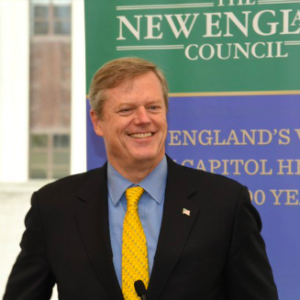One year ago, when Gov. Chris Sununu announced New Hampshire wouldn’t participate in a regional cap-and-tax carbon plan, he was roundly criticized by green activists who said he was making the Granite State the odd man out in the Northeast.
“The governor’s response is premature and disappointing,” said Roger Stephenson, regional advocacy director for the Union of Concerned Scientists who lives in Stratham, N.H.
On Tuesday came news that the Transportation and Climate Initiative (TCI) originally projected to reach from North Carolina to Maine would include just three states and Washington, D.C. And now, Sununu believes, New Hampshire is sitting pretty. In particular, because one of the three is neighboring Massachusetts.
TCI is a proposal to use a cap-and-trade pricing approach to drive down greenhouse gas emissions and generate revenues for transportation infrastructure among New England and Mid-Atlantic states. The initiative is facilitated by the Georgetown Climate Center, which worked closely with the Obama administration to design and implement climate change policies.
A report released last December estimated a 17 cent-per-gallon boost to reach TCI’s goal of a 25 percent reduction in greenhouse gas emissions (GHGs). However, a more recent study by the Beacon Hill Institute for Public Policy Research, and commissioned by the Massachusetts Fiscal Alliance, projected a price increase of up to 26 cents per gallon. For diesel fuel, prices could jump as high as 52 cents per gallon.
As a result, Bay Staters could end up paying nearly $800 more a year in gasoline alone. Which is good news for New Hampshire retailers.
Asked by NHJournal if he believed New Hampshire would benefit economically from Gov. Charlie Baker’s decision to join the TCI Sununu said: “Yeah! I don’t see how we wouldn’t.”
“There’s no doubt that if you start adding a 20 or 25 cent extra gas tax, especially around the border of towns of Massachusetts —Haverhill, Methuen, Lawrence — there’s no doubt folks are going to come across the border to get gas and buy their groceries and whatever else they’re going to be purchasing,” Sununu said.
It’s not the first time Massachusetts has made New Hampshire’s economic life a little easier. Over the past two years, the Bay State has banned flavored vape products and menthol cigarettes. The result has been a boon in sales — and state revenue — along the border.
Ulrik Boesen, a senior analyst at the nonpartisan Tax Foundation, studied the impact of the Massachusetts ban and tells NHJournal: “New Hampshire saw their sales increase by 56 percent. There were significant increases in all the neighboring states simply because Massachusetts banned a popular product.”
The result was a drop in Massachusetts revenues, but not — Boesen said — a drop in smoking. Instead, “in Rhode Island and New Hampshire their sales increased by 56 percent, Vermont’s by 21 percent and Maine by 30 percent. Significant increases in all the neighboring states simply because Massachusetts banned a popular product,” Boesen said.
The TCI project began more than two years ago with 12 states, but on Monday just three — Massachusetts, Rhode Island and Connecticut, plus D.C. — actually signed on the dotted line. Baker was the only Republican governor to put his state in the program.
“Massachusetts, Connecticut, Rhode Island and D.C. are committing to bold action to achieve our ambitious emissions reduction targets while positioning the jurisdictions and the region to grow the clean transportation economy,” said Massachusetts Energy and Environmental Affairs Secretary Kathleen Theoharides.
Sununu objects to the TCI on both policy and pragmatic grounds. He’s long complained that the estimated $7 billion the scheme would generate for mass transit and infrastructure would come disproportionately from rural and exurban drivers.
“How do I ask a taxpayer in Franklin to get another 20 cents a gallon on their gas tax, so they can subsidize the debt service on the Boston MBTA system? That doesn’t make any sense to anybody,” Sununu said Tuesday.
He also notes TCI’s revenue math is based on the pre-COVID economy, which no longer matches the economic facts on the ground.
“You have to add on the aspect that more people are remote working, right? So all of the financial estimates of how much money that gas tax was going to bring in are likely going to fall short because more people are working remotely. So they’re [TCI advocates] are going to come back and raise the tax yet again,” Sununu said.
“This is one of those situations that could really snowball out of control in a very bad way economically.”
Not that Sununu is immune to the lure of mathematically dubious mass transit projects. After years of opposing spending on a commuter rail proposal connecting Manchester, Nashua and Lowell, Mass., Sununu and the GOP-controlled Executive Council voted to spend $5,4 million on study and design for the project.
All of it funded with federal dollars — for the moment. But the entire project would cost a quarter of a billion dollars, plus millions more in taxpayer subsidies every year. (Not including the massive cost overruns that plague projects like these.)
Could that change Gov. Sununu’s TCI calculations in the future?

